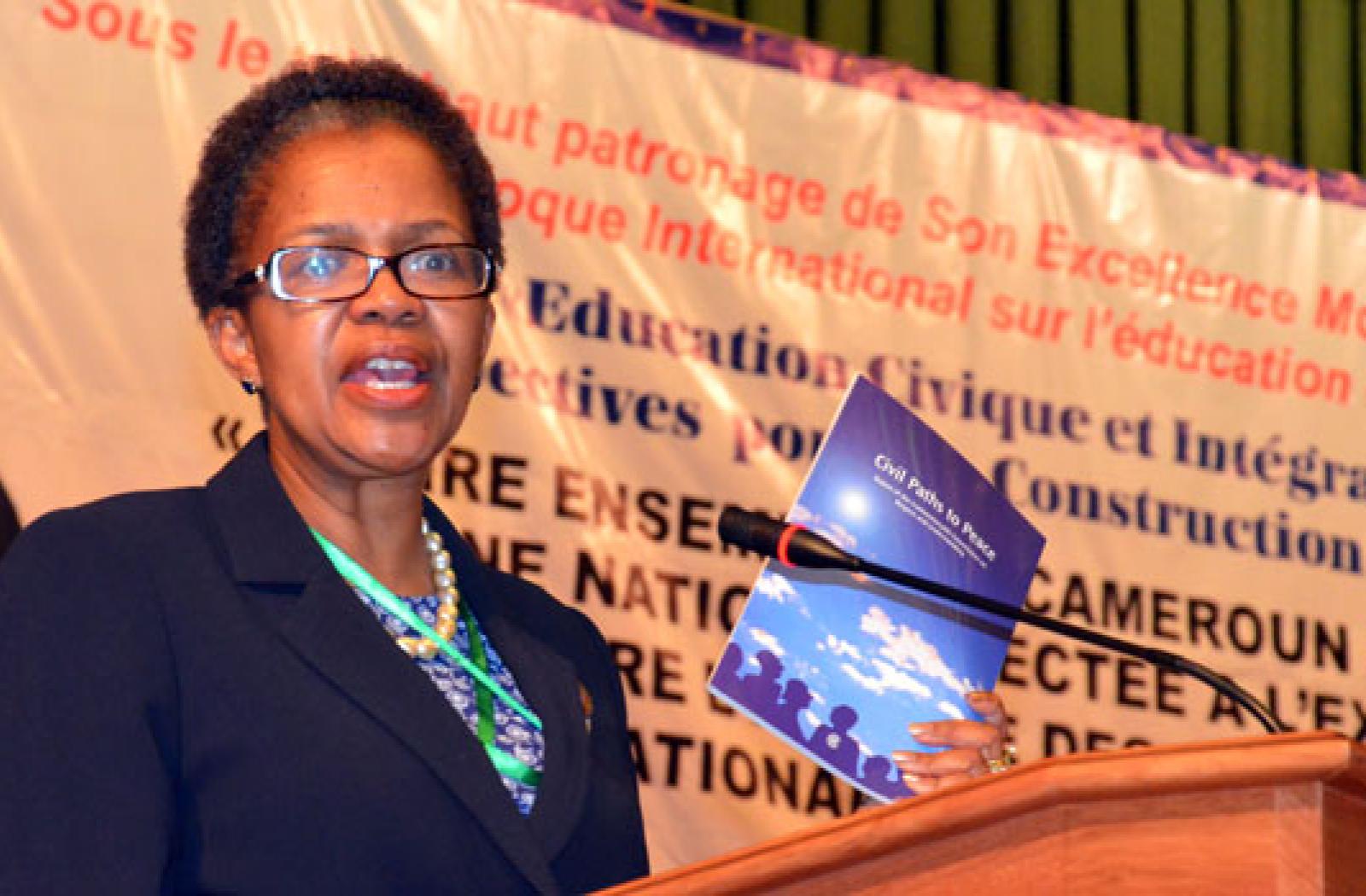Mmasekoga Masire-Mwamba addresses the first International Colloquium on Civic Education and National Integration in Cameroon

Commonwealth Deputy Secretary-General Mmasekoga Masire-Mwamba has said civic education is an effective way of deepening democracy, development, rule of law, respect of human rights and diversity - some of the key values and principles that define the modern Commonwealth.
Addressing a forum of over 2,000 national and regional leaders, young people, civil society groups, students and religious leaders’ groups at the first International Colloquium on Civic Education and National Integration in Yaounde, Cameroon, on 8 July 2013, Mrs Masire-Mwamba said civic education equips citizens with information and knowledge about their roles, rights and responsibilities.
She said Cameroon has set a good example by convening a national discussion on the subject of national integration
“Cameroon has not only taken practical and tangible steps to embrace Commonwealth values, but this forum clearly demonstrates that Cameroon gets the spirit of the Commonwealth,” she said.
Mrs Masire-Mwamba said that with over 200 languages and an Anglophone and Francophonie identity, Cameroon’s diversity is “a microcosm of the Commonwealth itself”.
“The Commonwealth family is home to over two billion citizens and is made up of the world’s largest and smallest, richest and poorest members. In such a context of diversity, it is even more imperative to cultivate and promote good civic habits,” she said.
The Deputy Secretary-General called on young people to participate fully in civic education and national integration activities to secure a peaceful and harmonious future.
“It is critical that we involve young people, who are the majority in most of our countries, including Cameroon, so that they can fully appreciate their roles, rights and responsibilities. I often say that we are living in a world of young people, with a few sprinklings of grey hairs of old people,” she said.
Mrs Masire-Mwamba said that since Cameroon joined the Commonwealth in 1995, there has been fruitful co-operation in the areas of strengthening election management through support to Elections Cameroon (ELECAM), enhancement of the justice sector, youth development and enterprise and strengthening of public institutions and the human rights commission. She thanked Cameroon for its effective participation in Commonwealth events, notably the last meeting of youth affairs ministers in Papua New Guinea, which the country’s minister attended.
While opening the conference, the Prime Minister of Cameroon, Philemon Yang, thanked the Commonwealth for participating in the forum, and said the country looked forward to learning from the experiences and best practices across the membership.
Deputy Secretary-General Masire-Mwamba said that the findings of the Commonwealth Commission on Respect and Understanding, an initiative set up by Commonwealth leaders to explore ways of promoting harmonious living between and among diverse societies, offers good lessons.
“The seminal report known as ‘Civil Paths to Peace’ that the Commission produced highlights elements such as education curriculum development, the importance of involving young people, and how respect and understanding can help prevent conflict and combat insecurity.
“Without an appreciation of our rights, as well as our obligations as citizens of Cameroon, the Commonwealth and the increasingly interconnected global community, we jeopardise the peace and prosperity within and beyond our borders,” she said.
The forum - the International Colloquium on Civic Education and National Integration - was addressed by cabinet ministers, religious leaders, representatives from the international community, the diaspora, students and traditional leaders.
Cameroon’s minister responsible for civic education and youth affairs, Bidoung Mpkatt, whose portfolio organised the three-day meeting, said the objective is to develop strategies and mechanisms to “further sharpen in every Cameroonian a civic and patriotic spirit and to always promote harmonious living”.


